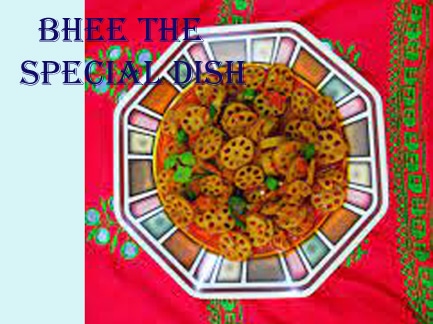
Bhee the Special Dish is a popular dish of the Punjab. Bhee is a special and delicious dish of the Asian countries. All over the Asia people like this dish. This dish is not only tasty and healthy but also useful in the diabetes type 2. All over the Asia people like to eat this vegetable in winter through different dishes. In Punjab, bhee dishes of jhang are popular. Many people send the bhee dishes to their relatives roosted, pakory and as vegetable.
The roots of bhee is used as food. In jhang its roots are obtained from Jhelum river near Head Trimoon 40 km away from Jhang City.
People go to the Jhelum river bank and look for its roots. bhee roots are found in the under water of river. People take it out and sell it in the vegetables market. There are many typs of dishes are prepared from this roots like bhee vegetable curry. pakora and soups. In winter its soup and pakora are eaten with interest.
Roots of bhee are crunchy and sweet, its taste is similar to the texture of a raw potato. There are various ways its dishes preparing like steamed, braised and fried. Bhee roots are used as herbal medicine in dry and powdered form.
Amazing Benefits of Bhee the Special Dish of Jhang
Helps in reducing stress
Bhee roots are rich in Vitamins B complex. This compound contain a special chemical called pyridoxine. pyridoxine helps to interacts with nerve receptors in the brain. This compound pyridoxine is responsible for reducing stress, headaches, and irritability. all benefits of Vitamin B complex can be get from this vegetable.
Beneficial for healthy skin and hair
There are too many health benefits of bhee roots, specially for skin. We can bring our glowing skin by Consumption bhee roots. lotus roots are rich in many types of vitamins like B and C. Vitamin C. These Vitamins stimulates collagen production in the body and help to keeping the skin firmness. This vegetable not only useful for body skin but also useful to skin firmness.
Bhee roots helps in curing inflammation
Inflammation is commonly in the middle of a burning sensation. it’s associate degree unpleasant facet impact or symptom of the many conditions. water lily will facilitate cut back inflammation. A 2013 study by trustworthy supply showed that 2 polysaccharides in lotus plum have vital anti-inflammatory drug effects.
Stimulate digestion
Bhee ( lotus roots ) are rich in large amount of fiber and it is helpful to stimulate digestion. Due to having source of fiber, this is the reason that it helps to combat constipation while guaranteeing the absorption of nutrients through the secretion of digestive juice and any stimulates peristaltic movement (intestinal contractions) within the enteral muscles to facilitate straightforward and loose internal organ movements.
Bhee roots lowering the blood sugar level
Bhee roots are rich in extra fiber and having low rate of carbohyderates. Due to less carb and extra fiber, bhee roots are beneficial for persons with diabetes because it has low glycaemic